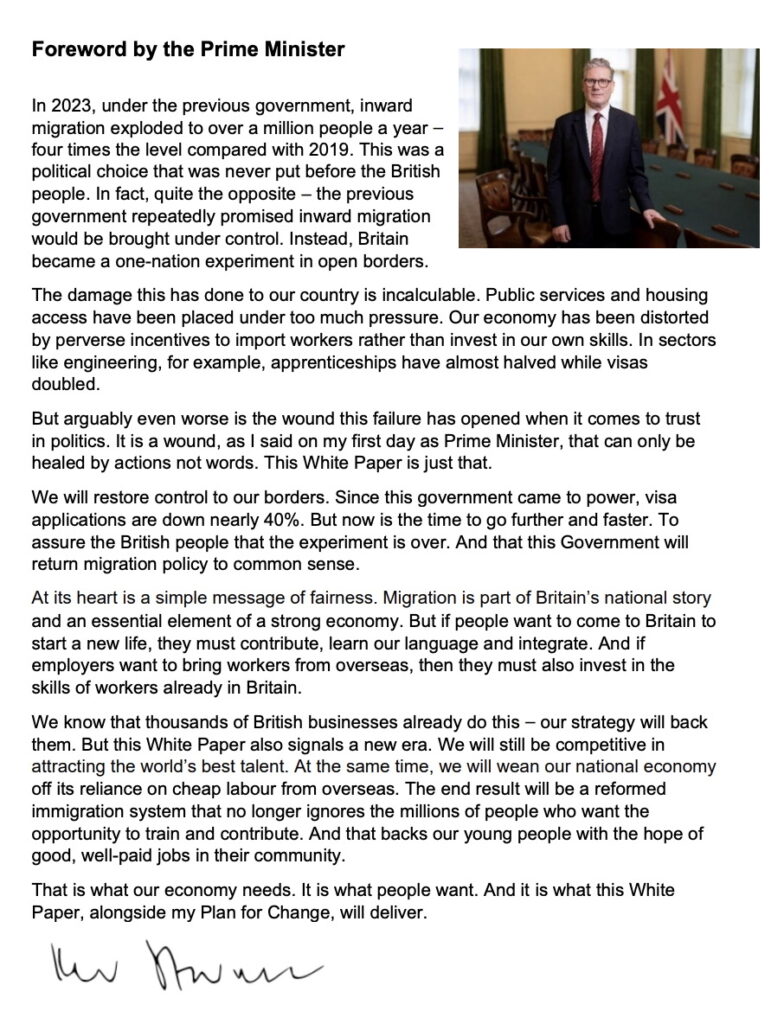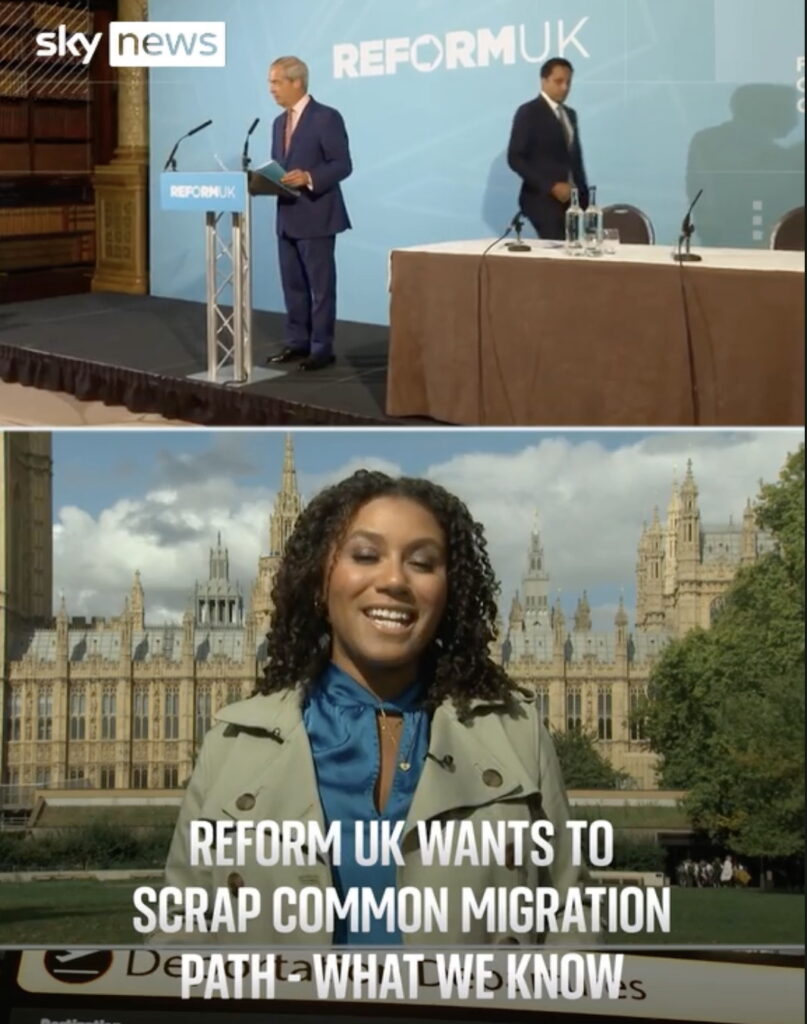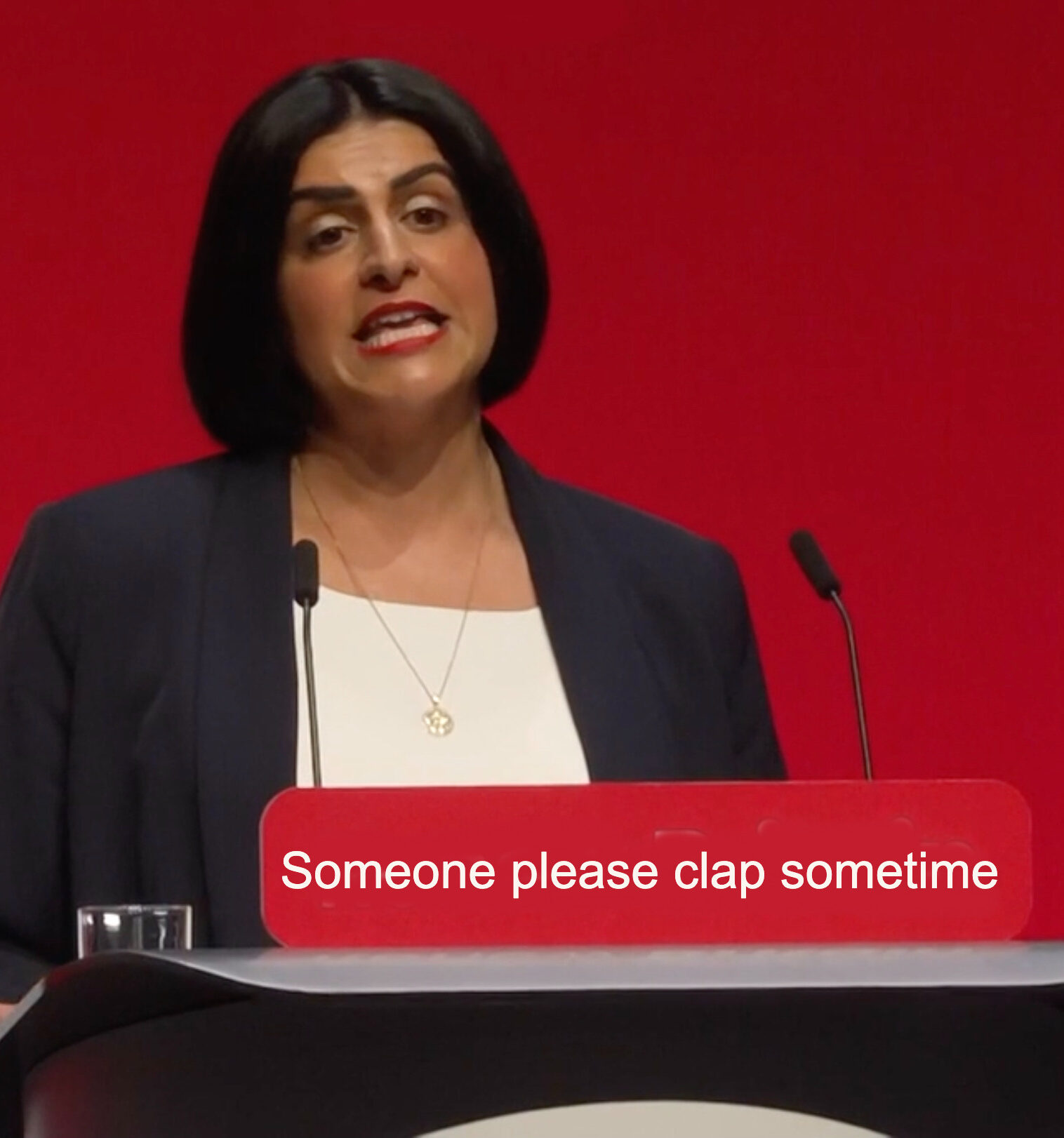LABOUR PULLS THE EMERGENCY CORD

In their Immigration White Paper “Restoring Control over the Immigration System” published in May 2025, the Labour government proposed extending the qualifying period for “Indefinite Leave to Remain” (ILR) from 5 years to 10 under its “earned settlement” reforms. The proposal did not stir massive controversy at the time.
The Migration Observatory at Oxford put together a useful summary of the effects these proposed changes would be likely to make by Dr Mihnea Cuibus.
Then, last week (Monday 22nd September) Reform UK launched their “Prioritising UK Citizens” proposals, announcing that, if elected, they would abolish ILR completely and replace it with renewable 5-year visas and rolling this change out across existing residents with ILR status. Reform had to speedily “clarify” that this would not change the status of EU citizens with ILR-equivalent “Settled Status”, which is protected by the EU Withdrawal Agreement.
Despite this “immorality”, however, the new post-Rayner Home Secretary, Shabana Mahmood, was sent out on to the gloom-ridden Labour Party conference stage in Liverpool today (Monday 29th September, 2025) to announce that the government will increase the qualifications for granting ILR status by making the English language test more difficult, insisting that applicants have a clean criminal record and that applicants complete voluntary work within their communities in order to qualify for permanent settlement status. The audience’s total silence was the most eloquent intervention made all day.
Although the difference between doubling the qualifying period and making the criteria more difficult and abolishing the status entirely may seem relatively abstruse, the difference in approach may come to illustrate the divergent paths that the UK’s immigration system might take in coming years. The Prime Minister’s attempt to categorise Reform’s proposal as “racist” while moving to adopt most of their suggestion seems like a poorly judged basis for his attack as it will no doubt circle around to an attack on his own policy prescription.
Over the weekend the Prime Minister, preparing to look as though he was doing more to respond to Reform’s surge in the polls, denounced the proposal to scrap ILR as “immoral” and “racist” (BBC Laura Kuenssberg interview 28th September 2025 – You Tube.)

This article explains what ILR is, where it came from, how it currently functions, who holds ILR status and what difference the proposed reforms might make.
What is Indefinite Leave to Remain?
ILR is the immigration status that allows a non-British national to remain in the UK indefinitely, with no time limit on their stay. It confers the right to work, study, run a business, or simply live without restriction. Holders of ILR are generally entitled to access public funds and healthcare on the same basis as citizens (Indefinite Leave to Remain Rights and Status; EU Settled Status Entitlements.)
ILR is also the usual prerequisite for naturalisation as a British citizen. Under the British Nationality Act 1981, applicants for citizenship through naturalisation must already be “settled” in the UK, a term defined in the Immigration Act 1971 as either ILR or, for EU citizens, “Settled status” under the EU Settlement Scheme (Migration Observatory: Migrant Settlement in the UK, 2024.)
Historical Development
The concept of permanent settlement has existed in UK immigration law for decades, but the modern form of ILR emerged with the Immigration Act 1971. Before this, permanent residence was managed through a patchwork of concessions and administrative categories.
Over time, governments have used ILR policy to balance different political priorities. In the 1990s and 2000s this was relatively accessible for long-term residents. Since the early 2010s, successive governments have tightened rules, increased qualifying periods and raised financial thresholds repeatedly.
The end of EU free movement in 2020 added to ILR’s importance. For EU nationals, permanent residence under EU law was replaced by the EU Settlement Scheme, under which “Settled Status” became the de facto form of ILR protected by the Brexit Withdrawal Agreement (EU Settled Status Statistics, Home Office – June 2025.)
How ILR Works Today
There are several pathways to ILR.
Work: (e.g. Skilled Worker visas): after 5 years of continuous lawful residence
Family: (e.g. partner of a British citizen) also usually 5 years (some exceptions.)
Long residence: 10 years of continuous lawful residence, regardless of visa type.
Other: protection-based claims, armed forces service and discretionary cases.
In all cases, applicants must satisfy requirements relating to English language proficiency, knowledge of life in the UK, absence of serious criminal convictions and continuous residence without excessive absences (Migration Observatory, May 2025.)
Numbers
In the year ending March 2025, there were 173,000 grants of settlement, a 32% rise from the previous year (Home Office Immigration System Statistics.) Of these:
– 49,500 were to migrants who had entered on Skilled Worker visas, a 54% up year-on-year.
– 44,800 were to family members of British citizens or settled persons.
Looking at longer-term trends, the Home Office’s 2024 Migrant Journey report shows that 167,621 people were granted ILR in 2024. Of these, around 31% had originally entered the UK on a work route, with the majority of those in the “Worker” category.
Stock of ILR holders
While precise figures for the total number of people living in the UK with ILR are not routinely published, annual grants in the range of 150,000–170,000 suggest a very substantial settled population. Reform UK estimates that around 800,000 people who arrived between 2020 and 2024 will become eligible for ILR in the coming years (Evening Standard 23rd September 2025.)
It is important to note that EU citizens with “settled status” — around 4.2 million as of June 2025 — are not technically ILR holders, but their position is legally equivalent in most respects (The 3 Million, 23rd September 2025.)
Reform UK’s Proposal: Abolishing ILR

Reform UK’s proposal is unprecedented. They would abolish ILR for future applicants and replace it with renewable 5-year visas. Existing ILR holders – with the exception of EU citizens covered by the Brexit Withdrawal Agreement – would be required to reapply under the new system (Mhari Aurora, Sky News, 22nd September 2025).
The replacement visa would carry stricter criteria, including higher salary thresholds, tougher English language requirements, limited or no access to benefits and more restrictive family reunion rules (Morgan Smith Immigration 2025). Reform argues this would yield vast public savings – citing figures of £234 billion derived (and almost immediately corrected/denied!) by the Centre for Policy Studies – by reducing welfare payments and housing costs associated with migration (The Guardian 22nd September 2025.)
Criticism
The plan has been widely condemned by politicians and commentators across the spectrum (enough in itself to make you think that perhaps it might be on to something.) Legal experts argue that retrospectively stripping ILR from existing residents would be subject to serious legal challenge, potentially breaching both domestic law and international conventions
Business leaders and unions warn of a damaging impact on sectors already reliant on migrant labour, particularly health and social care. Civil society groups point out that undermining the permanence of settlement would erodes integration and leave families in a state of insecurity.
Labour’s Proposal: Extending ILR to 10 Years
Labour’s approach is less dramatic but still represents a major shift. Under its “earned settlement” proposals, the standard qualifying period for ILR would increase from 5 to 10 years, but there would be scope for accelerated settlement for those deemed to have made significant contributions through high earnings, shortage-occupation work, or exceptional service. The details of fast-track routes remain vague.
Implications
Extending the qualifying period would slow the flow of people into settled status. Migrants who might previously have become settled after five years would remain in temporary status for longer, incurring more visa fees and living with less security.
This may be seen as a way of ensuring that only those with a long-term commitment to the UK gain permanent residence. Yet critics argue it could deter skilled migrants from choosing the UK and impose unnecessary uncertainty on families and communities. (This surely requires comparative analysis against the visa/settlement regimes of other Western/European jurisdictions… no-one seems to have done this – next week perhaps!)
What’s at Stake
The contrast between the two proposals highlights a deeper political question: what should permanent settlement mean in the UK?
Individuals: ILR offers stability, a sense of belonging and the foundation for naturalisation. Removing or delaying it disrupts family life, long-term planning and mental wellbeing.
Society: settled migrants are more likely to invest in communities, buy homes and contribute civically. Weakening ILR risks creating a semi-permanent class of insecure residents.
Economy: ILR supports workforce retention. Its removal or restriction could worsen shortages in critical sectors.
Government: both Reform’s radical abolition and Labour’s extension will require new rules, guidance and processing capacity at a time when the Home Office is already under strain.
Conclusions
ILR has been the cornerstone of UK immigration settlement policy for 50 years. representing a balance between controlled migration and long-term integration.
Reform UK’s plan to abolish ILR would mark a rupture with that tradition, creating uncertainty for hundreds of thousands of residents and raising serious legal and administrative questions. Labour’s still-developing proposals are more cautious, as they try to navigate the narrow channel between acting in a way that may convince some voters that they “have a solution” while trying to avoid existing Labour supporters characterising these policy chances as either “racist” or “immoral.” Labour feel effectively boxed in on this issue. The Conservatives, perhaps concentrating on the feeling of the lift hurtling towards the bottom of the shaft, seem to have no material suggestion to make at all.
At stake are not only the lives of those who hope to call the UK home, but also wider questions of integration, social stability and economic vitality. It seems inevitable that regulations and qualifications will be tightened – the question will become whether Labour’s proposals can be implemented quickly enough and yield demonstrably sufficient results to head off Reform UK’s vertiginous rise in the polls. I suspect not.


Leave a Reply